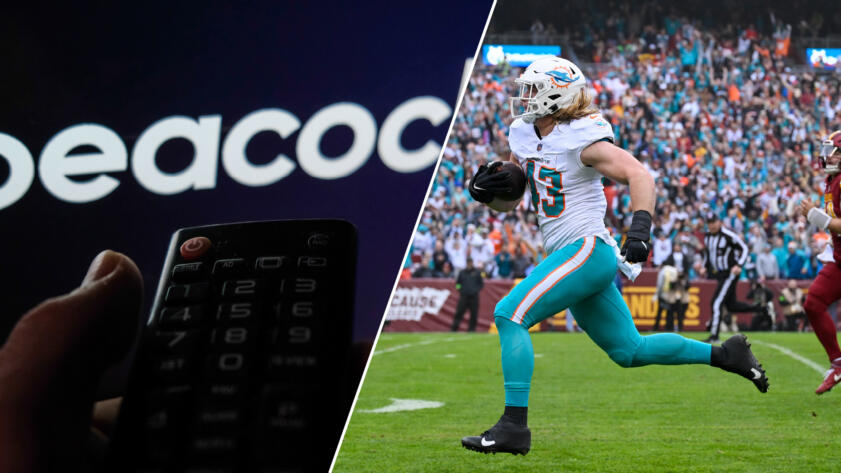With all of the uncertainty in the world today, there are few simple pleasures we can count on. In my family, football tops the list on Sundays (and Mondays and Thursdays and under the Friday Night Lights, but you get the point). But this Saturday, for the first time ever, swaths of the country will be denied viewership to one playoff game exclusively streaming on Peacock: The Miami Dolphins versus the reigning superbowl champs, the Kansas City Chiefs. Peacock, the streaming service from NBCUniversal, paid the NFL $110 million for sole streaming rights to this game; only fans in Miami and Kansas City will be able to watch the game on their local NBC channel. The rest of us must purchase a Peacock subscription, which starts at $5.99 a month.
Despite the controversies ranging from racial justice protests to brain injuries, football is one of the last sturdy pillars of the broadcast era, with an average of 16 million tuning in to each NFL game in 2023. Now streaming services are encroaching on this audience. I personally had to pay an extra $39 to YouTube TV, a prorated admission to the “NFL Sunday Ticket,” so I could watch my beloved Philadelphia Eagles embarrass me last week. If I keep the subscription, it would cost more than $400 a year for unfettered access next season.
As soon as it was clear that the Dolphins-Chiefs game would be confined to Peacock, football fans took to the internet looking for workarounds—one of which includes signing up for a two-week free trial of Instacart+, which comes with Peacock access. Chiefs defensive lineman Charles Omenihu is giving away 90 three-month subscriptions to Peacock after expressing his dismay about playing for an internet audience. But if you’re in a rural town like the one my parents live in, the only place you can order groceries is Walmart, so why would you deal with Instacart? Moreover, all of these stopgaps shut out people without credit or banking cards, and if your internet or cellular connection is dismal, you won’t be able to watch at all.
My stepdad Obbie Riley, who’s the hardest worker I know, loves to sit back in his recliner to catch the game. As he shared in our investigation with Capital B into broadband disparities in the rural Black South, my stepdad has spent the last two decades since he retired from the military trying to bring broadband to our area. Today—in the year 2024!—about 21% of households in Philadelphia, Mississippi, don’t have internet subscriptions, and that number is certainly higher in rural parts of the county. My home state leads the nation in households without internet access; and 16% of Mississippi households only have internet access via cell phones.
“I think it’s unfortunate,” my stepdad told me over the phone. “It goes beyond not being fair, it’s discriminatory to the poor and to the underserved community that don’t have streaming services. If you don’t have the bandwidth to stream and a credit card you’re left in the dark.”
Peacock is betting that the allure of the NFL playoffs, and sheer FOMO, will drive subscriptions. We can be certain other streamers will be paying close attention to the viewership numbers from this weekend’s experiment as well, to see if this will be a winning strategy.
It’s not surprising that big corporate dollars are winning out over consideration for those among us who have been denied access to the digital world. But it’s a terrible look. Four years after the onset of the Covid-19 pandemic, which exposed how important full internet access is to ensuring people can learn, work, and even get access to healthcare, you’d think we’d be more sensitive to the digital divide. Instead, rich companies are spending big to try and push viewers to their apps, while millions of fans are forced to sit on the sidelines.
Perhaps the below-freezing weather descending on Kansas City, where the teams are set to play in a predicted -30 degree wind chill, is an omen for streaming services to chill out on this game of monopoly.




